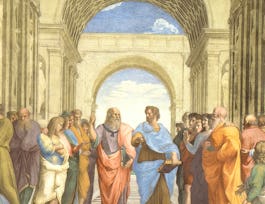This Massive Open Online Course (MOOC) will offer the participants an introduction into the most important classical sociological readings between the 18th and 20th century. Highly influential social science scholars, such as Karl Marx, Max Weber and Emile Durkheim, will be discussed during 8 sessions. Combined with small tests, based on the video’s and recommended readings, the participants will be encouraged to dive deeply into the complex texts and get familiar with classical sociological concepts that are still very relevant today.



Classical Sociological Theory


Instructors: Bart van Heerikhuizen
Sponsored by IEM UEM Group
126,318 already enrolled
(2,921 reviews)
Skills you'll gain
Details to know

Add to your LinkedIn profile
9 assignments
See how employees at top companies are mastering in-demand skills


Earn a career certificate
Add this credential to your LinkedIn profile, resume, or CV
Share it on social media and in your performance review

There are 9 modules in this course
In this session the field of classical sociological theory will be introduced. It explains the historical roots of sociology. It shows you why classical sociological theories are still important in modern societies and it explains the Aims and Claims of this Course.
What's included
8 videos3 readings1 assignment
This session explains the work of Adam Smith. It shows you how a poem written by Bernard Mandeville inspired Adam Smith. Adam Smith's theory shines light on the consequences of industrialization. You will learn what the consequences are of the Division of Labour.
What's included
7 videos1 reading1 assignment
This session will cover the author of the word “sociology”, August Comte. He often engaged in theorizing the social world in order to attempt to discover invariant laws. Terms like “positivism”, “the law of the three stages” and “Functionalism” are prominent topics in this session. Comte believed that positivism could both advance science (theory) and change the ways people live their lives (practice).
What's included
8 videos1 reading1 assignment
Tocqueville’s works shaped 19th-century discussions of liberalism and equality, and were rediscovered in the 20th century as sociologists debated the causes and cures of tyranny and revolutions. His famous work “Democracy in America” remains widely read and even more widely quoted. This session will cover Tocqueville’s most important ideas.
What's included
8 videos1 reading1 assignment
The German philosopher, radical economist, and revolutionary leader Karl Marx founded modern "scientific" socialism. His basic ideas, known as Marxism, form the foundation of socialist and communist movements throughout the world. Several topics like alienation, class struggle, and capitalism will be covered in this week's session.
What's included
8 videos1 reading1 assignment
When thinking of Durkheim, one thinks of social facts. According to Durkheim these social facts are the social structures and cultural norms and values that are external to, and coercive over, individuals. Durkheim argues that two social facts, in particular, influence suicide rates: integration, and regulation. This session will cover the views of Durkheim on topics like solidarity, suicide, and religion.
What's included
8 videos1 reading1 assignment
This week shines a light on the work of Max Weber. From social action, verstehen, and ideal types to rationalisation and his famous work on the Protestant Ethic. Weber's theory of society tried to account for the manner in which various symbolic factors take part in establishing social status, stratification and inequality. His influence still runs throughout the realms of politics, religion and economics.
What's included
8 videos1 reading1 assignment
Elias is the last of the Classical Sociologists. Elias' theory focusses on long term trends, with his so called process or figurational sociology. He shows us how the civilisation proces can be explained in terms like Self-Constraint and Figurations.
What's included
8 videos1 reading1 assignment
This is the final test. This test contains 87 question. To pass this test you need to answer at least 57 questions correct.
What's included
1 assignment
Instructors


Offered by
Why people choose Coursera for their career




Learner reviews
2,921 reviews
- 5 stars
87.82%
- 4 stars
10.49%
- 3 stars
1.19%
- 2 stars
0.27%
- 1 star
0.20%
Showing 3 of 2921
Reviewed on Mar 15, 2021
A good lecturer method
Reviewed on Aug 25, 2020
A concise and straightforward course on the classical theories of Sociology. I appreciate that it is presented in a non-jargon way that doesn't assume prior knowledge in the learner.
Reviewed on Feb 14, 2018
Great course, absolutely loved the teacher and his passion and how he explains difficult notions with so much ease. I would definitely recommend this course, it is a great first look into sociology.
Recommended if you're interested in Social Sciences

The University of Edinburgh

Parsons School of Design, The New School

Universidad de Chile

University of Virginia

Open new doors with Coursera Plus
Unlimited access to 10,000+ world-class courses, hands-on projects, and job-ready certificate programs - all included in your subscription
Advance your career with an online degree
Earn a degree from world-class universities - 100% online
Join over 3,400 global companies that choose Coursera for Business
Upskill your employees to excel in the digital economy


